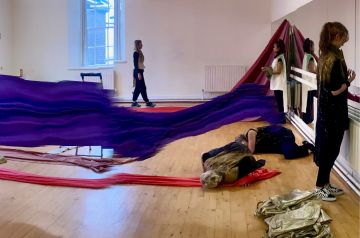Lyrical Bodies supports creative and research work, which contributes to increasing awareness, inclusion, and respect for those whose experience of the world is sensorially different.
Staff and students from South East Technological University (SETU) will join performance artist Amanda Coogan, and artists and theatre makers Alvean Jones and Lianne Quigley, to share their interpretation of Waterford playwright Teresa Deevy’s little-known ballet, Possession, during Coogan’s residency in the Hugh Lane Gallery from 14 to 18 June.
Deevy’s script Possession presents an outline of the story of the Táin. The play dramatises the Cattle Raid of Cooley but, unusually, Deevy focuses on Queen Maeve’s perspective throughout. Coogan calls her current exploration of Deevy’s work the Possession Project, which she, Jones, and Quigley plan to develop into a production for Dublin Theatre of the Deaf.
Lyrical Bodies
Led by Dr Úna Kealy, lecturer in Theatre Studies and English at SETU Waterford's Department of Arts, staff created a satellite project around Coogan’s Possession Project entitled Lyrical Bodies. Funded by the SETU Equality, Diversity and Inclusion fund and the SETU Research Connexions fund, Lyrical Bodies supports Coogan, Quigley, and Jones in their creative and research work and contributes to increasing awareness, inclusion, and respect for those whose experience of the world is sensorially different. Irish Sign Language/English interpreters Caoimhe Coburn Gray and Ela Cichocka work alongside the Lyrical Bodies team to facilitate communication within the development room.
Unique insights into Deaf Culture and Deaf experience
Coogan, Quigley, and Jones are innovative and exciting interpreters of Deevy’s work. All three artists have unique insights into Deaf culture and Deaf experience as Coogan, an internationally renowned performance artist, is also a hearing CODA (Child of Deaf Adults) and Jones and Quigley are Deaf. Their consideration of Deevy’s work offers a uniquely interesting interpretation opportunity because Deevy was deafened in her early adulthood and created characters not simply through her use of dialogue, but through inscribing action, reaction, and intention on and through actors’ bodies and through her use of costume and stage properties.
Inclusive process of learning and exploration
Speaking of the project, artist Alvean Jones argued that “It is important to give people from different communities and skill-sets opportunities to work together. The SETU students are amazing—they show so much promise as performers and have so much to give to the project. The Deaf community, with its background in community drama, likewise, have so much to give to the project.” Quigley added, “The progress we have made since last February, when we first visited SETU to start the project, has been amazing. We come from different backgrounds, we have different skills and ways of reading the world, but our journey working together has been an inclusive process of learning and exploration for everyone.”
Enhance the teaching and learning environment of SETU
Lecturers in SETU, and researchers within the Lyrical Bodies project, Dr Kate McCarthy and Dr Jenny O’Connor are also joined by Garter Lane Dance-Artist-in-Residence, Deirdre Grant, lecturer in Theatre Studies on the SETU Waterford Bachelor of Arts (Hons) programme. Dr McCarthy described the project as “modelling how it is possible to include and respect everyone in the creative process” arguing that “the results are a much more interesting and richly textured interpretation.” Dr O’Connor added, “One of the goals of Lyrical Bodies is to enhance the teaching and learning environment of SETU by introducing collaborative and experiential learning opportunities for staff and students. This project gives our graduates a unique set of tools and the confidence to use these upon graduation.”
When hearing and Deaf people work together
Alvean Jones and Dr Kealy conclude by agreeing that, as a Deaf woman, Deevy confounded what society expected of her. Jones argued that “Deevy’s life is a brilliant example of the success possible when hearing and Deaf people work together collaboratively.” Dr Kealy added that, “Deevy’s way of working models excellent collaborative skills, creative innovation, and persistence. Her text, Possession, explores the hollow and self-defeating impact of possession by force and our collaboration, by embracing ideals of access, collaboration, and equal participation, is enriched as a consequence.”
Amanda Coogan's Possession will be performed in the Hugh Lane Gallery from 14 to 18 June. Admission is free. For more information visit:
https://www.hughlane.ie/lectures/forthcoming-lectures/3638-possession


